For the 2025 school year, there is 1 public middle school serving 248 students in Kellogg Joint School District. This district's average middle testing ranking is 5/10, which is in the bottom 50% of public middle schools in Idaho.
Public Middle School in Kellogg Joint School District have an average math proficiency score of 30% (versus the Idaho public middle school average of 39%), and reading proficiency score of 56% (versus the 55% statewide average).
Minority enrollment is 7% of the student body (majority Hispanic), which is less than the Idaho public middle school average of 26% (majority Hispanic).
Overview
This School District
This State (ID)
# Schools
4 Schools
306 Schools
# Students
1,138 Students
110,410 Students
# Teachers
66 Teachers
6,331 Teachers
Student : Teacher Ratio
17:1
17:1
District Rank
Kellogg Joint School District, which is ranked within the top 50% of all 172 school districts in Idaho (based off of combined math and reading proficiency testing data) for the 2021-2022 school year.
The school district's graduation rate of 80-84% has stayed relatively flat over five school years.
Overall District Rank
#83 out of 173 school districts
(Top 50%)
(Top 50%)
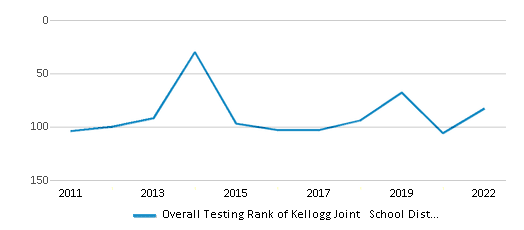
Math Test Scores (% Proficient)
36%
42%
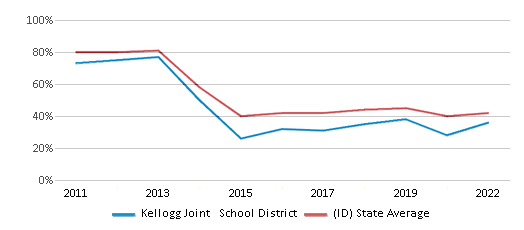
Reading/Language Arts Test Scores (% Proficient)
57%
55%
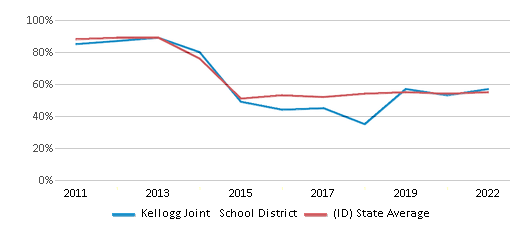
Science Test Scores (% Proficient)
32%
41%
Graduation Rate
80-84%
80%
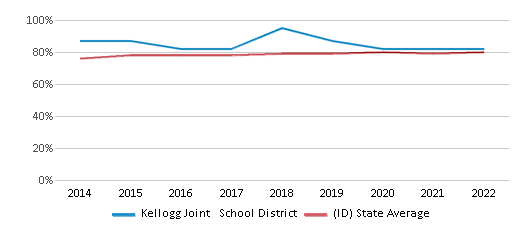
Students by Ethnicity:
Diversity Score
0.12
0.42
# American Indian Students
12 Students
1,395 Students
% American Indian Students
1%
1%
# Asian Students
6 Students
1,141 Students
% Asian Students
n/a
1%
# Hispanic Students
30 Students
21,210 Students
% Hispanic Students
3%
19%
# Black Students
3 Students
1,056 Students
% Black Students
n/a
1%
# White Students
1,065 Students
81,638 Students
% White Students
94%
74%
# Hawaiian Students
4 Students
364 Students
% Hawaiian Students
n/a
1%
# Two or more races Students
18 Students
3,632 Students
% of Two or more races Students
2%
3%
Students by Grade:
# Students in PK Grade:
17
184
# Students in K Grade:
99
3,645
# Students in 1st Grade:
95
3,963
# Students in 2nd Grade:
105
4,063
# Students in 3rd Grade:
91
4,070
# Students in 4th Grade:
88
4,030
# Students in 5th Grade:
95
4,637
# Students in 6th Grade:
70
17,938
# Students in 7th Grade:
84
24,606
# Students in 8th Grade:
94
24,908
# Students in 9th Grade:
88
6,112
# Students in 10th Grade:
76
4,061
# Students in 11th Grade:
73
4,132
# Students in 12th Grade:
63
4,061
# Ungraded Students:
-
-
District Revenue and Spending
The revenue/student of $12,550 is higher than the state median of $10,185. The school district revenue/student has declined by 12% over four school years.
The school district's spending/student of $11,666 is higher than the state median of $9,364. The school district spending/student has declined by 12% over four school years.
Total Revenue
$14 MM
$3,215 MM
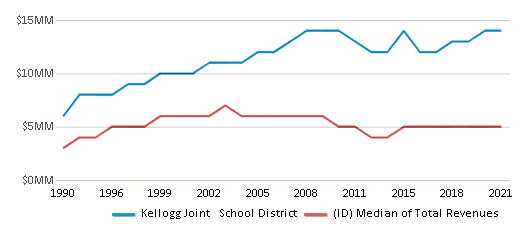
Spending
$13 MM
$2,956 MM
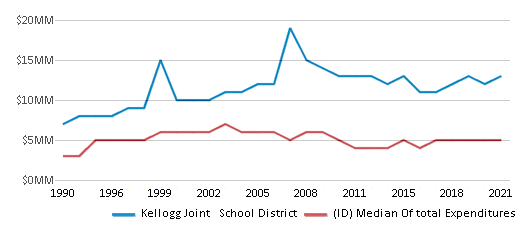
Revenue / Student
$12,550
$10,185
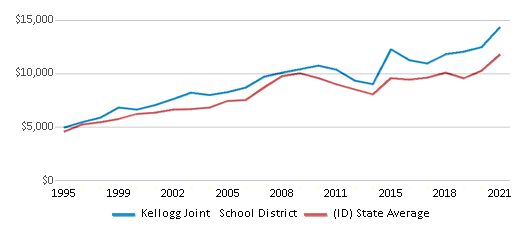
Spending / Student
$11,666
$9,364
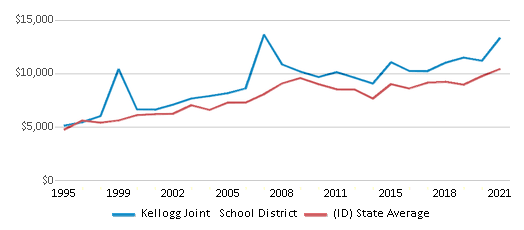
Best Kellogg Joint School District Public Middle Schools (2025)
School
(Math and Reading Proficiency)
(Math and Reading Proficiency)
Location
Grades
Students
Rank: #11.
Kellogg Middle School
(Math: 30% | Reading: 56%)
Rank:
Rank:
4/
Bottom 50%10
790 Bunker Avanue
Kellogg, ID 83837
(208) 784-1311
Kellogg, ID 83837
(208) 784-1311
Grades: 6-8
| 248 students
Recent Articles

Year-Round Or Traditional Schedule?
Which is more appropriate for your child? A year-round attendance schedule or traditional schedule? We look at the pros and cons.

Why You Should Encourage Your Child to Join a Sports Team
Participating in team sports has a great many benefits for children, there is no doubt. In this article you will learn what those benefits are.

White Students are Now the Minority in U.S. Public Schools
Increasing birth rates among immigrant families from Asia and Central and South America, combined with lower birth rates among white families, means that for the first time in history, public school students in the United States are majority-minority. This shift in demographics poses difficulties for schools as they work to accommodate children of varying language abilities and socio-economic backgrounds.





